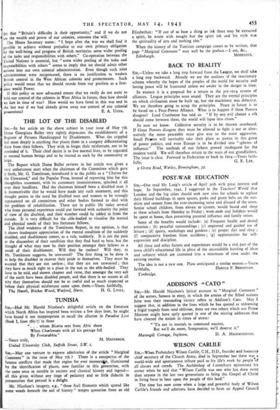THE LOT OF THE DISABLED
Sta,—In her article on the above subject in your issue of May 7th Dame Georgiana Buller very rightly deprecates the establishment of a Register of Persons Handicapped by Disablement. What the crippled feel most deeply is anything that places them in a category differentiating them from their fellows. They wish to forget their misfortune, not to be reminded of it. Their chief desire is to live normal lives, to be regarded as normal human beings and to be treated as such by the community at large.
The Report which Dame Buller reviews in her article was given a very unfortunate start when the chairman of the Committee which gave it birth, Mr. G. Tomlinson, introduced it to the public as a " Charter for the Unwanted," and the Popular Press, instead of reproving him for this thoughtless statement, with its customary insensitiveness, splashed it all over their headlines. Had the chairman himself been a disabled man it is inconceivable that he would have made any such statement, and this thought points to the need for disabled men and women to be strongly represented on all committees and other bodies formed to deal with the problem of rehabilitation. There are in public life today several who from personal experience could put forward with authority the point of view of the disabled, and their number could be added to from the outside. It is very difficult for the able-bodied to visualise the mental and physical needs of their less fortunate fellows.
The chief weakness of the Tomlinson Report, in my opinion, is that it shows inadequate appreciation of the mental condition of the suddenly disabled, and disablement comes, as a rule, suddenly. It is not the pain or the discomfort of their condition that they find hard to bear, but the thought of what may now be their position amongst their fellows as a result of their disablement. Will they be useless? Will they, as Mr. Tomlinson suggests, be unwanted? The first thing to be done is to help the disabled to recover their pride in themselves. They must be assured that they are not useless ; that they are not unwanted ; that they have as much right to a place in the sun as the able-bodied. They have to be told, and shown chapter and verse, that amongst the very salt of the earth have been disabled people, and that there is no reason at all why they themselves should not be as useful and as much respected as before their physical misfortune came upon them.—Yours faithfully, The Hazels, Bricker Wood, Watford, Herts. H. G. LYALL.


























 Previous page
Previous page